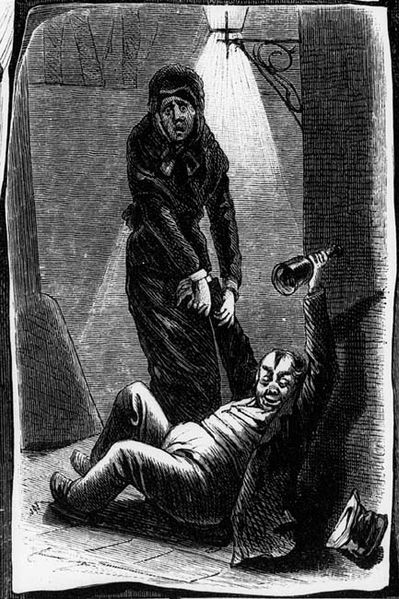Alcoholism
For patient information, click here
|
Alcoholism Microchapters |
|
Diagnosis |
|---|
|
Treatment |
|
Case Studies |
|
Alcoholism On the Web |
|
American Roentgen Ray Society Images of Alcoholism |
Editor-In-Chief: C. Michael Gibson, M.S., M.D. [1]
Identification and diagnosis
Effects
Social effects
The social problems arising from alcoholism can be significant. Being drunk or hung over during work hours can result in loss of employment, which can lead to financial problems including the loss of living quarters. Drinking at inappropriate times, and behavior caused by reduced judgment, can lead to legal consequences, such as criminal charges for drunk driving or public disorder, or civil penalties for tortious behavior. An alcoholic's behavior and mental impairment while drunk can profoundly impact surrounding family and friends, possibly leading to marital conflict and divorce, or contributing to domestic violence. This can contribute to lasting damage to the emotional development of the alcoholic's children, even after they reach adulthood. The alcoholic could suffer from loss of respect from others who may see the problem as self-inflicted and easily avoided.
Alcohol withdrawal
Alcohol withdrawal differs significantly from most other drugs because it can be directly fatal. While it is possible for heroin addicts, for instance, to die from other health problems made worse by the strain of withdrawal, an otherwise healthy alcoholic can die from the direct effects of withdrawal if it is not properly managed. Heavy consumption of alcohol reduces the production of GABA, which is a neuroinhibitor. An abrupt stop of alcohol consumption can induce a condition where neither alcohol nor GABA exists in the system in adequate quantities, causing uncontrolled firing of the synapses. This manifests as hallucinations, shakes, convulsions, seizures, and possible heart failure, all of which are collectively referred to as delirium tremens. All of these withdrawal issues can be safely controlled with a medically supervised detoxification program.
Societal impact
The various health problems associated with long-term alcohol consumption are generally perceived as detrimental to society, for example, money due to lost labor-hours, medical costs, and secondary treatment costs. Alcohol use is a major contributing factor for head injuries, motor vehicle accidents, violence, and assaults. Beyond money, there is also the pain and suffering of the all individuals besides the alcoholic affected. For instance, alcohol consumption by a pregnant woman can lead to Fetal alcohol syndrome,[1] an incurable and damaging condition.[2]
Estimates of the economic costs of alcohol abuse, collected by the World Health Organization, vary from one to six per cent of a country's GDP.[3] One Australian estimate pegged alcohol's social costs at 24 per cent of all drug abuse costs; a similar Canadian study concluded alcohol's share was 41 per cent.[4]
A study quantified the cost to the UK of all forms of alcohol misuse as £18.5–20 billion annually (2001 figures).[5][6]
Stereotypes

Stereotypes of alcoholics are often found in fiction and popular culture. The 'town drunk' is a stock character in Western popular culture.
Stereotypes of drunkenness may be based on racism, as in the depiction of the Irish as heavy drinkers.[7][8] In Australia and Canada, Aboriginal people have similarly been stereotyped as alcoholics.
Politics and public health
Because alcohol use disorders are perceived as impacting society as a whole, governments and parliaments have formed alcohol policies in order to reduce the harm of alcoholism. The World Health Organization, the European Union and other regional bodies are working on alcohol action plans and programs.
See also
- Adult Children of Alcoholics
- Alcohol consumption and health
- Alcohol tolerance
- Drunkenness
- Substance abuse
- Wernicke-Korsakoff syndrome
- Medical diagnostics to test for alcohol use
References
- ↑ CDC. (2004). Fetal Alcohol Syndrome: Guidelines for Referral and Diagnosis. Can be downloaded at http://www.cdc.gov/fas/faspub.htm
- ↑ Streissguth, A. (1997). Fetal Alcohol Syndrome: A Guide for Families and Communities. Baltimore: Brookes Publishing. ISBN 1-55766-283-5.
- ↑ "Global Status Report on Alcohol 2004" (PDF). World Health Organization. Retrieved 2007-01-03.
- ↑ "Economic cost of alcohol consumption". World Health Organization Global Alcohol Database. Retrieved 2007-01-03.
- ↑ "Q&A: The costs of alcohol". BBC. 19 September 2003.
- ↑
- ↑ "World/Global Alcohol/Drink Consumption 2007".
- ↑ "The World's Drunks: The Irish".
Further reading
- Berry, Ralph E.; Boland James P. The Economic Cost of Alcohol Abuse The Free Press, New York, 1977 ISBN 0-02-903080-3
- Royce, James E. and Scratchley, David Alcoholism and Other Drug Problems Free Press, March 1996 ISBN-10: 0-684-82314-4 ISBN-13: 978-0-684-82314-0
- Valliant, George E., The Natural History of Alcoholism Revisited, Harvard University Press, May 1995 ISBN-10: 0-674-60378-8 ISBN-13: 978-0-674-60378-3
- Pence, Gregory, "Kant on Whether Alcoholism is a Disease," Ch. 2, The Elements of Bioethics, McGraw-Hill Books, 2007 ISBN-10: 0-073-13277-2.
- Milam, Dr. James R. and Ketcham, Katherine Under The Influence: A Guide to the Myths and Realities of Alcoholism. Bantam, 1983, ISBN 0-553-27487-2
- Warren Thompson, MD, FACP. “Alcoholism.” Emedicine.com, June 6, 2007. Retrieved 2007-09-02.
- Etiology and Natural History of Alcoholism. National Institute on Alcohol Abuse and Alcoholism.
Template:Link FA Template:Link FA
ar:إدمان كحولي zh-min-nan:Chiú-cheng tiòng-to̍k bs:Alkoholizam bg:Алкохолизъм ca:Alcoholisme cs:Alkoholismus cy:Alcoholiaeth da:Alkoholisme de:Alkoholkrankheit et:Alkoholism eo:Alkoholismo eu:Alkoholismo fa:الکلیسم gl:Alcoholismo hr:Alkoholizam id:Alkoholisme is:Alkóhólismi it:Alcolismo he:אלכוהוליזם jv:Alkoholisme lt:Alkoholizmas mk:Алкохолизам mt:Alkoħoliżmu ms:Alkoholisme nl:Alcoholisme no:Alkoholisme nn:Alkoholmisbruk oc:Alcolisme simple:Alcoholism sk:Alkoholizmus sl:Alkoholizem sr:Алкохолизам sh:Alkoholizam fi:Alkoholismi sv:Alkoholism tl:Alkoholismo tg:Алкоголизм uk:Алкоголізм yi:אלקאהאליזם